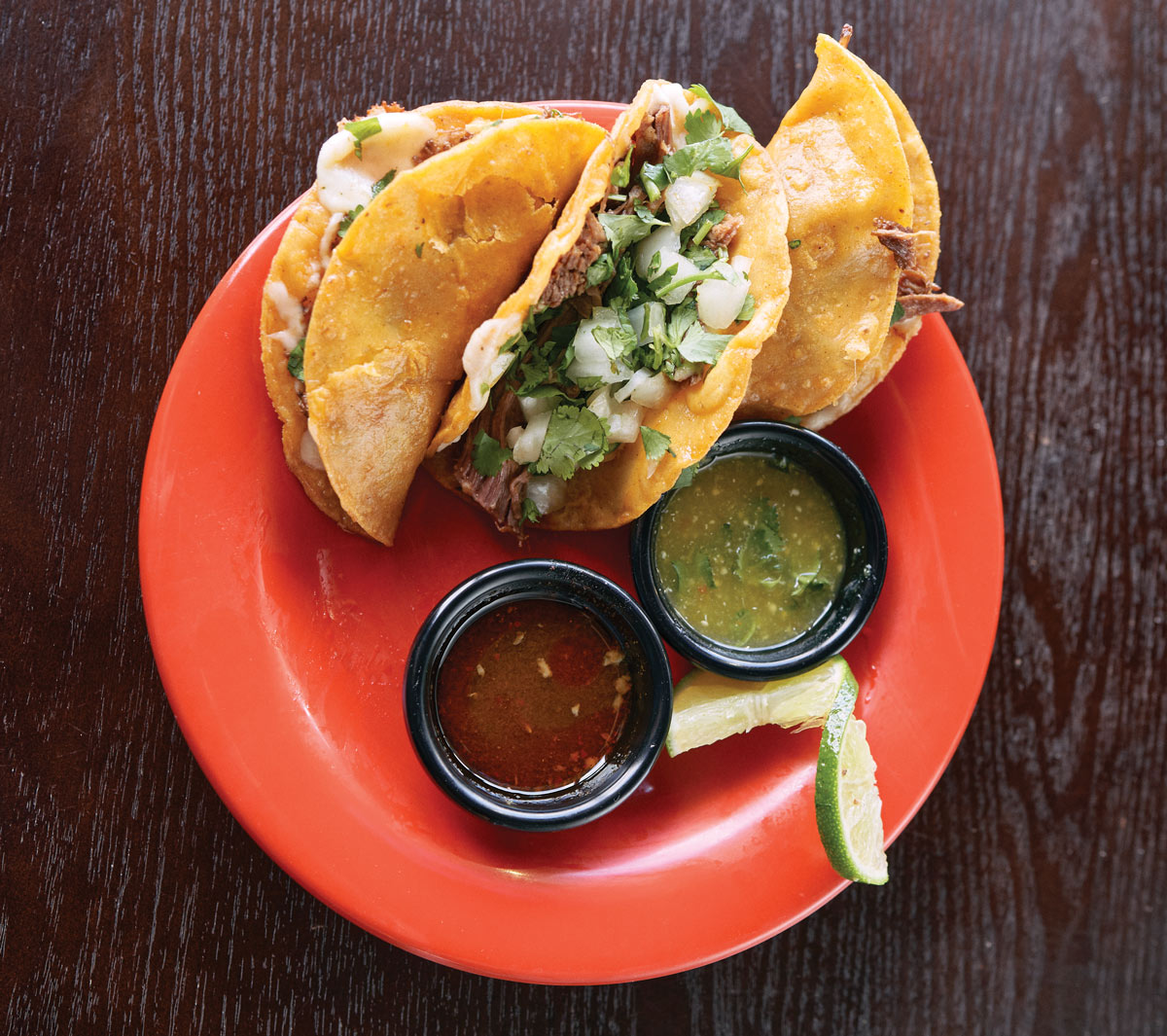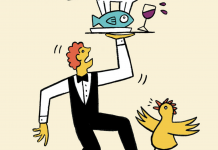
Photograph by Ben Rollins
During the pandemic summer of 2020, after more than a decade working in restaurants, Yvette Becerra was scrambling to make ends meet. The coffee shop where she’d worked as a barista reduced its hours; a month later, her job as a sous chef at a health-food store ended when the place reduced its staff. Peanuts became her salvation.
One day in July, on an excursion to Dahlonega, Becerra and her partner, Jessica Hamilton, found themselves fantasizing about moving out of the city and opening a roadside stand that sold boiled peanuts—Becerra’s favorite. Shopping at Kroger later that day, they came across a half-bushel bag of raw peanuts. They bought it on a lark, boiled the nuts with chilis and spices in the kitchen of their North Decatur home, and—finding themselves now in possession of excess gallons of boiled peanuts—started asking friends and neighbors if they wanted to buy some. They sold out quickly, made an Instagram account—@atlpnuts—and decided to do it again, with unique flavorings like peaches and beer. Orders exploded. “We had a waiting list for our waiting list,” Hamilton says. Encouraged by the success, Becerra decided to turn to her real dream: serving food inspired by her Mexican heritage and her childhood nickname, La Gorda. Soon, ATL P’nuts and Gorditas ATL (a pop-up serving breakfast burritos, flautas, tacos, and other street food) were bringing in enough cash to pay the bills.

Photograph by Ben Rollins
The turbulence of the past year, and the flexibility afforded by an expanded pickup and delivery culture, has brought a fresh batch of first-time pandemic proprietors to Atlanta’s already thriving pop-up scene. Whether due to financial desperation, disenchantment with corporate restaurant culture, or simply a desire to try something new, social media–driven pop-ups have filled a gap left by shuttered indoor dining—and found a hungry audience in locals desperate for a break from home cooking. Now, diners scavenge Instagram to find a new generation of decentralized, underground “restaurants,” often heading to someone’s backyard, driveway, or parking lot for the promise of pork and cabbage dumplings (@katsdumps) or wing-topped pizza (@phewpies) or fragrant pan dulce (@churrobreadco).

Photograph by Ben Rollins
Mauro Cruz, aka Chef Smokey ATL, earned his moniker by turning to firewood-cooked birria—chili-stewed meat—after losing work at his construction job as the pandemic hit. Cruz, who grew up in Guerrero, Mexico, was anxious to find a way to support his wife and three kids: “I was like, I gotta do something. I gotta pay rent, I gotta pay the bills.” He’d worked in restaurants before, and friends had always liked his food, so Cruz posted to Instagram that he was selling 50 pounds of birria from a couple of massive slow cookers at his Austell home. He sold out within an hour, then sold out again when he made double the next day. His wife and mom were initially skeptical that he could make money just selling birria from their backyard, but weeks later, when he took Chef Smokey ATL to an event at his friend’s lowrider car club, his following blew up. Whenever he opened for business, cars filled the street leading to Cruz’s home. He bought a food truck and started slinging birria tacos full-time.

Photograph by Ben Rollins
Similarly, when Daniela Guevara was laid off from her job as a cook, “the survival instinct kicked in.” Like most restaurant workers, she already wasn’t recession-proof. But, she was also an undocumented immigrant—meaning that, unlike other industry employees, she wasn’t eligible for stimulus money or unemployment benefits. “We didn’t get pandemic care. We didn’t get unemployment,” she says. “And we just had to figure it out and start something different.”

Photograph by Ben Rollins
Guevara doubled down on a small baking business she’d been operating on the side, but it still wasn’t enough. So, she and Marco Saldierna—a friend she’d met years ago working at Bacchanalia—decided to try out a tacos and tortas pop-up, simply named Dani Marco Tacos (DMT). The business launched last summer. Immersed in the rush of something new, Guevara and Saldierna, who still had a job as a line cook, remember heading to Saldierna’s apartment late at night to prep for a DMT tasting the next day: roasting tomatoes, making ice cream, slow-cooking their own birria with onion, salt, chili, tomato. By August, the duo was selling more than $1,000 in tortas in a single day out of Saldierna’s apartment; by March, DMT brought in enough profits to where Saldierna could quit his other job. (Editor’s note: Since this article went to press, Saldierna has moved on from DMT to other projects.)
For novice food vendors, the learning curve can be steep: figuring out ordering, taxes, equipment. With Covid-19 as a backdrop, they’ve also had to factor in the cost of things like protective gear. “We can go through a box of gloves in two hours if we’re busy,” Guevara says. With the pandemic rattling the fragile food supply network, procuring certain ingredients has proved another challenge: Sometimes, Becerra and Hamilton might visit four different stores searching for the tortillas they need.

Photograph by Ben Rollins
As vaccines roll out, it’s unclear if the Instagram-fueled success of new underground pop-ups will continue at the same pace. But it’s allowed several different food businesses to mature into full-time enterprises. DMT has expanded hours as a pop-up at We Suki Suki in East Atlanta Village and vends food every Wednesday at Boggs Social & Supply in West End—the neighborhood where brewery Wild Heaven also sells Becerra and Hamilton’s ATL P’nuts. The latter pair, meanwhile, are raising money to turn their Gorditas ATL pop-up into a food truck. And in March, Mauro Cruz opened Chef Smokey as a brick-and-mortar restaurant in downtown Austell, partnering with another business to sell birria atop tacos, burgers, and even pizzas. Cruz credits his swift success, at least in part, to the base of nearly 20,000 followers he built on Instagram.
Over the last year, Guevara became disenchanted with the restaurant industry. She’d never felt more disposable as a worker than during the pandemic, and she saw how some restaurants relied not just on small-business assistance to reopen—they also relied on the undocumented staff they’d laid off, who received no financial help of their own, and who had little choice but to go back to work at businesses that recently had left them in the lurch. That “vicious cycle” cemented her commitment to go into business for herself. “If you didn’t take care of your people that needed the help during the pandemic, and you had the money to spare, I feel like you don’t deserve to have people like us,” she says.
For DMT, pivoting to a new venture is a way to address such structural inequalities in the industry. She and Saldierna are applying lessons learned from prior experiences—both bad and good—to consider how they hire as they grow, or how to create a more inclusive workplace. Guevara says DMT is inspired by companies with fairer, cooperative-style structures—like Vermont-based King Arthur Flour, which is 100 percent employee owned. “You don’t need to be broke all the time,” she says. “It shouldn’t have to be like that.” And while the hours are still long, it feels different now: “This time, it matters. There’s something we’re building.”













